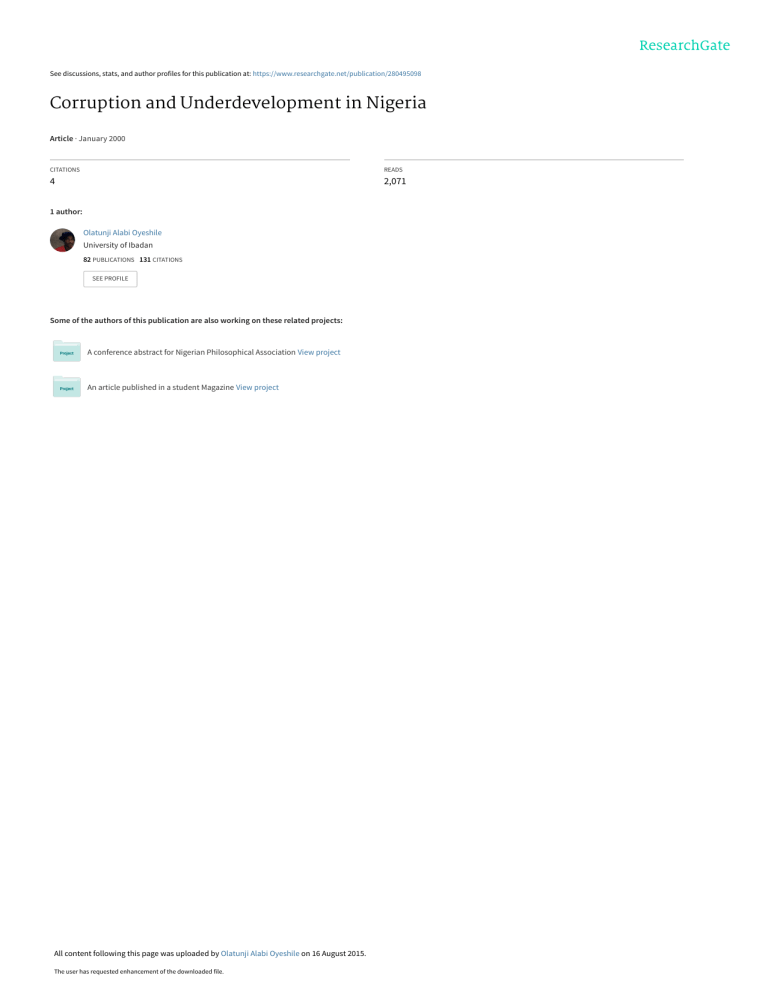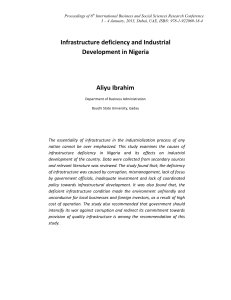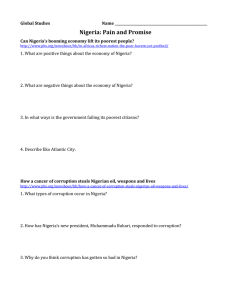
See discussions, stats, and author profiles for this publication at: https://www.researchgate.net/publication/280495098
Corruption and Underdevelopment in Nigeria
Article · January 2000
CITATIONS
READS
4
2,071
1 author:
Olatunji Alabi Oyeshile
University of Ibadan
82 PUBLICATIONS 131 CITATIONS
SEE PROFILE
Some of the authors of this publication are also working on these related projects:
A conference abstract for Nigerian Philosophical Association View project
An article published in a student Magazine View project
All content following this page was uploaded by Olatunji Alabi Oyeshile on 16 August 2015.
The user has requested enhancement of the downloaded file.
CORRUPTION
AND UNDERDEVELOPMENT
IN NIGERIA
By
,
"i ,
:I
Olalunji A. Oyeshile
Introduction
Factors that account for the underdevelopment of any society.
nation or country are numerous. The most widely talked about. which is
also common to many societies, is corruption. Although. corruption is a
global practice, the attempt in this essay is to examine how it has
contributed to the underdevelopment of Nigeria as a nation. and the
challenges Nigerians have to meet in order to reduce its incidence.
Defining Corruption
The term corruption is not amenable to easy definition. but going
by' chambers 20th Century Dictionary, corruption implies the' following
terms, among others, namely: "rottenness: putrid matter: impurity:
bribery". For our purpose, the latter term, bribery. captures our use of
corruption. Bribery which is the "act of giving or taking bribes". derives
from the noun and verb forms of bribe which mean. "something offered
to influence the judgement unduly or corrupt the conduct: to steal: to
influence by a bribe; to gain over".
:;3
_____
.:;_~ ;. ,,'((Ill.
VII.
i.
!.OIXI -----------------------
It follows front this that bribe or bribery plays a central role in
corruption or corrupt practices. In other words. one easily determines the
act of corruption when bribes or bribery is present. Corrupt practices will
embrace receiving
of kickbacks.
misappropriation
of funds. nepotism.
extortion. employment
patronage and so forth. A corruptionist.
on this
showing. will be one who defends or who practices corruption.
Corruption and the Nigerian Nation
Corruption
has almost become a way of life in Nigeria. It is also
the bane of development
and a major cause of social conflicts. The
instruments of corruption in Nigeria include money. position. contracts
and gifts of all kinds. These instruments are used as bribe. to pervert.
manipulate.
fasten, reverse- and favour unnecessarily.
In simple terms.
people are bribed in order to get what ordinarily they are not entitled to.
or do not deserve at that material point in time. For instance. a parent
can bribe education officials to get his ward into a school for which he is
not qualified: a lady can offer sex to members of the panel of interview
in order to be considered
suitable for appointment:
contracts can be
awarded to firms based on the bribe they give to government
officials
even though such firms do not measure up to the required standard. The
list is endless.
At the recent Catholic Bishops Conference
of Nigeria (CBCN)
th
held between
Feb 22 lid _26 •
1999, one of the sub-themes
for the
conference
was corruption
and the Nigerian nation. In a communique
issued at the end of their meeting, the conference
decried the situation
whereby corruption
almost passes as a state policy. In Nigeria today.
corruption
is almost in every department
of our national life. Many
government
corporations
and parastatals are no longer efficient or have
either groundedro
a halt. The Ajaokuta steel project which has been on
for twenty years and still remains incomplete
after the expenditure
of
several billions of Naira is a case- in point. Also. bribery and corruption
rear their heads in sports - both in competition and selection of athletes;
in elections-voters
and electoral officials are bribed; in employment.
in
appointments
and even in assessments.
The National Electric Power Authority. Nigeria Postal Services.
the Ports
Authority,
The Nigerian
Railways.
the Customs,
the
Immigration.
the Nigerian Army. the Nigerian
Police. the University
system and other educational
institutions,
the health sector. the civil
.
Corruption and Underdevelopment
111
Nigeria
5S
service and so forth have also been smeared with tile oil of corruption.
This makes one wonder whether the problem of corruption
can be
tackled in the country.
Though, we have focused more on corruption mainly in public or
government
institutions, corruption in its various forms also manifests in
private realms and institutions - such as the house, the church, the
company. social groups and so forth. For instance. a pastor of a church
who embezzles the money of the congregation,
the preacher who goes to
bed with both married women and spinsters in his church, the husband
that has carnal knowledge of the sister-in-law, a co-author who reprints a
textbook secretly without the knowledge of the other co-author, a teacher
who awards undeserved
marks to female students, or a lecturer who
collects
money
forcefully
from students
so that they can pass
examination,
are all engaged in corrupt practices.
Sometimes,
a distinction is made between corrupt acts and acts
of indiscipline.
No matter the distinction the two are related. Though, not
all acts of indiscipline are corrupt acts, all acts of corruption are acts of
indiscipline.
The situation we have in Nigeria, especially
since the time
of Babangida administration,
is a full institutionalization
of corruption.
Corruption
is now a way of life. In fact. one begins to' wonder whether
corruption is not a Nigerian. Corruption, as the Catholic Bishops suggest,
is a disease that is likely to kill its host - Nigeria. This is because it is
capable of destroying the immunity of the host. thereby making nonsense
of the nation's heath.
Consequences
of Corruption
Perhaps,
one does not need to be taught the consequences
of
corruption
in Nigeria in the last four decades, as the devastating effects
. are so obvious.
According
to the Catholic
Bishops, .some of the
unwholesome
effects of corruption include gross inefficiency
in public
institutions, diminished productivity in both public and private sectors of
the economy,
discouraged
investment,
fuelled capital flight, increased
unemployment
and inflation. Others include: an acute degree of poverty,
severe decline in the quality of life in Nigeria. bad international
image
and so forth. Apart from these effects. corruption
through any of its
fOnTIS is also seen as "an affront on human dignity, an assault on the-
56
Recall.
Corruption
No. t. 20()O
human conscience and a negation of the Christian vocation [0 build here
on earth a kingdom of trust and justice" (The Light, March, 199 P. i)
At this juncture, we want to brietly examine some of the causes
of corruption in Nigeria. We have identified the following causes among
others:
Greed - This has to do with man's tendency to possess what does
not belong to him and to gain unnecessary advantage over others.
The kleptomaniac leaders we have had for some time couid not
overcome this problem.
•
Spirit of domination - Any human being or group that has a spirit
of domination would always want to use foul means to gain
advantage either to be in power, or to be seen as relevant in certain
circumstances.
•
Lack of security in the Nigerian Social System - Many Nigerians
receive bribes because they are afraid of what will become of their
social security tomorrow. This is a system that has no effective
pension system; the disabled are not protected; widows are neglected
and the sick ones are not catered for. So in the thinking of some
Nigerians, the earlier one is able to accumulate wealth, through
whatever means. the better. The idea is that they are saving for the
raining day.
•
Unemployment
- This a situation whereby qualified and
employable adults are not employed. AI1d because of their survival
instinct. they engage in all sorts of dubious and sharp practices,
sometime in connivance with their kith and kin in government.
•
Poverty
- The scourge of poverty among third world countries
.particularly in Nigeria, is such that those 'human beings' who are'
. employed can not meet the basic needs of life with their income.
Hence, they resort to collecting 'kola' or 'brown envelopes' in order
to meet their obligations to themselves. their families and their
society.
•
The problem of authoritarism
and the non-accountability
of
military governments in Nigeria - During military rule, might
was right. Most military governments we have had Nigeria have
{llIdprdel·doflllll'lII
III
Nigl'rl(l
57
shown utter disregard for the rule of law Money i~primed and spent
at will with the people in power being accountable to nobody This
kind of practice reached its crescendo in the ,t\ I,;\cha dictatorship.
Gen. Abacha's wife and the wives of state governors spent most of
the tax prayers money on non-feasible programmes. Who dare
question them? Furthermore, government ministers. governors and
commissioners had a spending spree. No wonder then that the
current civilian administration is doing its best to probe the corrupt
practices of the past.
Causes oj Corruption
•
and
•
Lack of an Adequate Justice System - Where there is flight of
justice, where the common man cannot gel a fair hearing. where you
don't get what you deserve unless you know the man in-charge.
corruption can not but flourish. The popular slogan of "Man know
man" in Nigeria is nothing but an invitation to corruption. It is the
case that, in many of our public institutions, people don't get what
·they deserve at all or on time without knowing people.
•
Perverted Moral Order - Call it Westernization or urbanization,
Nigerians do not bother any longer about traditional values which
enjoin chastity, obedience.
honesty and devotion to duty.
Government officials swear under false oath. and they forge
certificates and other documents. The case of former Speaker of
House of Representatives, Alhaji Salisu Buhari, readily comes to
mind. Many Nigerians no longer respect the injunctions of the alien
religions which they have accepted. They swear falsely with the
Bible and Quran and yet go ahead to commit untold atrocities. The
Christian and Moslem God must be extremely kind with Nigerians.
You dare not swear falsely with Sango-god of thunder _. or Ogun
- god of iron.
•
Illiteracy - People capitalize on the fact that some people don't
know their rights; hence, they can easily be manipulated by the
corruptionists. Coupled with illiteracy is povehy of thought. While
some people are educated and enlightened, their minds are not
cultured and developed. They still run after what Niltzsche calls the
'herd instinct'. They are savage in approach, and their ultimate goal
is to amass material wealth to the detriment of the society.
II-
'I'"
I!!j'
,Ii
I
I
::: I.
'II
;I
5;~
/ictoll .. Vu. I.
!l)()I)
---'-
In his Faculty
features
0["
the corrupt
--------------
."
1\. ;\ ,)]upnClll<\ lll!,!ltltghts some of the
Nigel'iall CC\)IlC"IlII]ill ihc last thirty years. These
an economy in rapid regression Into u,:ep poverty and
deprivation inspire of the enormous amount of resources which
have been at the disposal of the country during those years.
(t)
(ii)
a society that is gradually
trust,
devotion
to
interdependence. and
(iii)
a polity in which no government which started out
its tenure pursuing
all anti-corruption
agenda
lasted more than twenty months while those that
publicly
proclaimed
their preference
for the
venality of corruption in the economy. society and
politics have survived for up to nine years
(A Political
Economy of Corruption
losing its social capital of
duty
and
commune 1
and tlnderdevelopment.
1998: 2)
The features identified above underscore the fact that corruption
has been institutionalized
in Nigeria and governments
which set out to
fight corruption always meet strong resistance.
Efforts to Combat Corruption
Attempts have been made in the past years to eradicate
corruption. There have been conferences. symposia. government policies
and outright punishment of corrupt individuals. In 1982. for instance. the
Nigerian
Anthropological
and Sociological
Association
held a
conference
in Zaria.
The theme
was.
Nigeria: Corruption in
Development .. The Catholic conference of 1999, had as one of its subthemes, Nigeria and Corruption. The Murtala Mohammed/Obasanjo
administration;
the Buhari/ldiagbon
administration:
and the present
Obasanjo/ Atiku administration are noted for their anti-corruption
stance.
• But a similar thing can not be said of Shagari. Babangida and Abacha
administrations.
It is interesting to note that while some of these efforts have
yielded fruits in the past, some Nigerians have duly and dutifully resisted
the attempt to make Nigeria a corrupt-free nation. For instance. the first
bill of President Olusegun Obasanjo to the National Assembly was titled.
View publication stats
Corruption and Underdevelopment in Nigeria
59
Lecture.
are:
"
____
.. A hill for J law to prohibit and punish. bribery and corruption of or by
public officers and other persons". Although the bill is being scrutinized
again arul again, there are fears in some quarters that the bill is likely to
put an end to their corrupt practices. There are others who see the
president's
efforts as one of those that will go the usual way. For
instance. it is claimed that,
the air of change which appears to flow round about president
Olusegun Obasanjo may not really be the first of its kind in a
cheque red confrontation with the cancer of corruption
(Vanguard, July 2, 1999, p.l3.)
The obvious question
now is this: Which way Nigeria? The
foregoing discussion has shown the hydra-headed
nature of corruption
and its damage to the Nigerian polity. But we can not fold our arms and
give up if we are to have any meaningful development. We must start by
noting' that any solution to this problem must be a collective one.
However. much still depends on the government. The government must
restore confidence
and hope in Nigerians by dOing 'die"to11owmg:
. provision of security for future; ensuring complete democratization
as
this will enable people to demand for their rights as and when due and
would also enable them to know the limitation of government power
over the lives of the citizens; the maintenance of an adequate justice
system: alleviation
of poverty; promotion ·of the rule of law; and
emphasis on human welfare in government programmes.
Of course all the above sounds theoretical and would hardly
work if there is no commitment on the part of Nigerian leaders and
citizens. Leaders should lead by example and the citizens under this
situation have little choice but to follow the path of dignity. We must
appeal to our conscience and decide whether we really want a corrupt-.
free society or not. We must also show that we have a stake in the kind
of development we want. It should be an all-round development,
not just
economic development.
Everybody must have a stake in the survival of
the Nigerian nation - in its social, political and economic endeavours.
We should try to rebuild the individual and collective consciences of our
citizens.
The achievement
of a corrupt-free
21
herculean. but definitely not an impossible, task.
S(
century
Nigeria
is an
!,
il
I
iI
'\I


